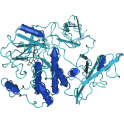
- Remove this product from my favorite's list.
- Add this product to my list of favorites.
Products
Newsletter
 |  |  |  |  |  |

Background: Yes is a cytosolic ubiquitously expressed tyrosine kinase, sharing a high sequence similarity to Src. As all Src family members Yes is formed of an N-terminal membrane localization domain, a poorly conserved unique domain, an SH3 domain, an SH2 domain, a tyrosine kinase domain and a short carboxyterminal regulatory sequence. Yes is activated downstream of a multitude of cell surface receptors and during the cell cycle transition. Activated kinase is involved in different signaling processes such as proliferation, survival and regulation of the cytoskeleton e.g. the formation of the tight junction.
Protein: Recombinant human YES protein kinase, amino acids M1-L543 (as in GenBank entry NM_005433)*, N-terminally fused to GST-HIS6-Thrombin cleavage site
Theoretical MW (Abl1): 91.0 kDa (fusion protein)
Expression system: Baculovirus infected Sf9 cells
Purification: One-step affinity purification using glutathione agarose
Storage buffer: 50 mM Tris-HCl, pH 8.0; 100 mM NaCl, 5 mM DTT, 4 mM reduced glutathione, 20% glycerol
Protein concentration: 0.116 mg/ml (Bradford method using BSA as standard protein)
Method for determination of Km value & specific activity: Filter binding assay MAFC membrane
Specific activity: 29.000 pmol/mg min
Entrez Gene ID: 7525
UniProtKB: P07947
Ordering information: shipped on dry ice
Summy JM, Qian Y, Jiang BH, Guappone-Koay A, Gatesman A, Shi X, Flynn DC. (2003) “The SH4-Unique-SH3-SH2 domains dictate specificity in signaling that differentiate c-Yes from c-Src.” J Cell Sci. 15;116 (Pt 12):2585-98.
Barraclough J, Hodgkinson C, Hogg A, Dive C, Welman A. (2007) "Increases in c-Yes expression level and activity promote motility but not proliferation of human colorectal carcinoma cells.” Neoplasia.;9 (9):745-54.
Summy JM, Sudol M, Eck MJ, Monteiro AN, Gatesman A, Flynn DC. (2003) "Specificity in signaling by c-Yes.” Front Biosci. 1; 8:s185-205.
Welcome Login
Contact us
Follow us